
Welcome to Night Vale started out modestly enough when it launched in 2012 as a podcast offering a glimpse into the odd happenings of a fictional Southwest desert town through its community radio show. In the years since, it has grown into a podcast network that produces six other podcasts, enjoyed success as a touring live show, and spawned two novels, the most recent of which, It Devours! (Harper Perennial), came out in October. Jeffrey Cranor, who co-created the podcast with his friend Joseph Fink, grew up in the Dallas area and attended Texas A&M University. Cranor now lives in New York, but his job keeps bringing him back to Texas. He attended the Texas Book Festival in early November, and the latest Night Vale live show, “All Hail,” will be performed in San Antonio on November 28 and in Dallas on November 29.
Texas Monthly: Let’s start at the very beginning. How did Night Vale come into existence?
Jeffrey Cranor: It came into existence because Joseph Fink and I were friends in New York. I was involved in a theatre company there for many years, for about a decade, called the New York Neo-Futurists. Cecil Baldwin, the narrator of our podcast also was in that company, as are several of the other people we’ve worked with through the years on Night Vale. Joseph actively took workshops with us and also volunteered for us, so we spent a lot of time hanging out and talking about writing. One of the things that we would go off on tangents about would be all the podcasts we were listening to, and Night Vale came out of that.
TM: What was the original idea for Night Vale?
JC: We didn’t want to make something that people were already making—we wanted something that could fit more with our own talents. There didn’t seem to be any serial fiction podcasts at the time, so we went with the idea of writing a fiction story. Joseph wrote out a whole bunch of these short weird paragraphs that he cobbled into the pilot episode and asked Cecil to record it. He emailed me the pilot episode exactly as it is now and said, “I don’t know, I was thinking something like this, does this sound cool?” and I said, “This sounds amazing, let’s do it.” So we started writing episodes and figuring out what the world of Night Vale would be.
TM: How do you find yourself explaining Welcome to Night Vale when you’re introducing it to someone for the first time?
JC: My standard answer for a longer elevator ride is usually something like, “Welcome to Night Vale is a podcast done in the style of a community radio show of a small Southwest desert town, where every conspiracy theory is true and things such as secret police, angels, and ghosts are just commonplace parts of everyday life.” The shorter version of that, which my artist friend said one time, is, “Night Vale is like if Neil Gaiman and Stephen King had started a game of the Sims and just left it running for years.”
TM: That is a great description.
JC: I really love that description a lot.
TM: Is there a real town that inspired Night Vale’s fictional setting?
JC: I grew up in Mesquite, and I was always taken by the giant KEOM tower at Memorial Stadium. I love that tower so much because it’s unnecessarily huge for a community radio station. I thought about the broadcasting power of a tiny little radio station that plays hits from the seventies and then has student DJs come on in the afternoon to do traffic reports and community updates. I always loved the idea that off toward I-20 there’s a whole row of—I don’t know if they’re radio or cell towers, it’s just this series of blinking red lights hanging in midair. There’s something mysterious about all of the humanity and all of the language going out invisibly, represented by a single red light blinking in the night sky. There’s something beautiful about that image to me.
TM: Did any Texas radio stations contribute to the structure of Night Vale?
JC: I went to Texas A&M and in my first two years in college, I did a lot of weekend drives back home. I would usually wait until the last possible minute on Sunday to drive back to school, so I’d do the three-and-a-half-hour drive back late at night. This is before having any MP3 player or phone, so when I would get tired of my tapes, I would usually search the radio for a talk show that wasn’t politics or sports. A lot of times it would be something along the lines of a relationship call-in show, or a community thing. It was very calming to listen to people call in—I wasn’t really that interested in the relationship advice, but having a doctor-type voice in your life is comforting, someone to guide you through life. Over time, Night Vale has taken on its own voice, but early on when we were writing the episodes on how to structure things, I thought about the structure of the community calendar or traffic reports on KEOM.
TM: Night Vale has a diversity of characters—not just in their voices, but in their gender, their race, their sexuality. Is that intentional?
JC: Yeah. Night Vale is weird fiction, but ultimately we’re trying to write about the world as it is, and it feels sort of lazy to keep the same set of suburban white people names or make most of the characters men. Even with names you hear in the background, it just seems more interesting to have different names presented to people rather than just Steves and Jennifers and Jeffs and Josephs. Ultimately this comes from trying to reflect the actual world we live in.
TM: Who are your favorite Night Vale characters?
JC: One of my favorite characters to write for has always been Pamela Winchell, the Director of Emergency Press Conferences. I really love writing for her because she has a very unrealistic job. Most of her press conferences are announcements of just the most bizarro conspiracies or fantastic descriptions of something in space and time. She’s a little harder to write for with the new administration, because watching Sean Spicer, I’m like, “that guy just stole our bit.” It becomes a little bit more difficult. Pamela always exits in a weird way—she turns into a hologram and vanishes or she rides off on a horse that suddenly appears out of nowhere. I think one time she ended it by hiding behind a tree and telling everyone, “I’m not here,” and I’m probably misremembering that, but I think Sean Spicer literally hid behind a bush one time. It’s like, “Well, I gotta rethink how we write Pamela here.”
TM: Night Vale can have a real sense of terror and horror. That goes down to the show’s idioms, like the line “Death is only the end if you assume the story is about you.” Where do those moments come from and how much do they reflect your perspective?
JC: When we write, Joseph and I are interested in avoiding true cynicism. Not to say that we don’t write things that aren’t dark or questioning existence like bleak existential statements—it’s always a balancing act in storytelling—but I always like things funny, and we definitely go with that with Night Vale. We also want to have characters that make decisions that mean something to them. For all of Night Vale’s silliness, the characters aren’t just being silly for the listener’s sake or for my sake. They’re doing that because I feel, and Joseph feels, that those actions serve the story and make them more human, even if a character is not technically a human. We really want to try to balance that out. Dealing with things like sadness, or ennui, or true fright—these deeper, heavier feelings are things that we try to balance out.
TM: Since Night Vale premiered in 2012, you’ve created a series of other podcasts, written two books, and toured the show across the world. How did you transition the podcast into these other formats?
JC: When we started doing the live shows, we knew we didn’t want to just take an episode we’d already written or mash together old episodes. We knew we had to write something new. We write our live shows in a way that’s accessible to people who’ve never seen it before and gives something new to fans. We also write them in a way that directly acknowledges the audience, incorporating some type of audience interaction—at minimum, Cecil taking their energy and then giving it back. Sometimes we have call-and-response, or somebody from the audience who has to be addressed in some way. Joseph and I are very comfortable writing for the stage, so that was the first place that we went after the podcast. Then when we wrote the first novel a couple years ago, we took it out of Cecil’s perspective to the third-person. We thought, “let’s get into these other characters and let’s see Night Vale from these other points of view, rather than Cecil’s, and really explore the town.”
TM: Beyond Night Vale, you write Within the Wires, a podcast told through fictional relaxation tapes. Can you describe the concept behind it?
JC: Our goal with Within the Wires was to play with the intimacy of podcasting. Radio has always been so soothing with that single voice, so my co-writer, Janina Matthewson and I wanted to play with the trust you may or may not build with the narrator. In the first season of Within the Wires, ostensibly a ten-cassette set of relaxation guides to help you with breathing exercises and different visualization techniques to relax, we wanted the listener to go through the motions of breathing and movement and thinking about their bodies and thinking about their minds. But we also wanted to implant in the very first episode the idea that “Oh, I’m a character in the story, this is a form of storytelling. I’m a prisoner in some type of medical institute and this narrator is actually directing tips right at me and is trying to get me to escape.” We had so much fun doing that, we thought let’s keep going with this—each year we’ll do a series of tapes or recordings that are ostensibly some kind of public record, but that tell a story. This season we did a set of museum audio guides.
TM: The Night Vale Presents network has expanded into other podcasts such as the Orbiting Human Circus (of the Air) and Alice Isn’t Dead. Do those universes overlap in any way?
JC: No, because we create them so differently and in different spaces. I don’t collaborate with Joseph on Alice Isn’t Dead and he doesn’t collaborate with me on Within the Wires. We hadn’t really developed any master plan to overlap any of those. With the Orbiting Human Circus (of the Air), Julian Koster has his own thing going. I think we’re all averse to the crossover episode idea, so we’ve let them have their own space.
TM: What can people expect in the future from the Night Vale Presents network of podcast and shows and books?
JC: Hopefully to be able to continue doing it. We’ve never set any type of end date, nor a type of end story point. It’s fun to continue telling the stories of these characters and watching them get older. It would be really amazing to watch these characters grow up and get older and maybe go to college, maybe have kids, maybe get married, buy a car. There’s still a lot of universe left to be confusing with.









